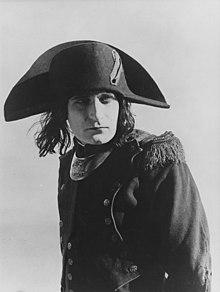Napoléon (1927 film)
| Napoléon | |
|---|---|

|
|
| Directed by | Abel Gance |
| Produced by | Abel Gance |
| Written by | Abel Gance |
| Starring | |
| Music by |
|
| Cinematography | Jules Kruger |
| Edited by |
|
| Distributed by | Gaumont |
|
Release date
|
|
|
Running time
|
330 minutes (and various other lengths) |
| Country | France |
| Language | Silent film with intertitles |
Napoléon is a 1927 silent French epic film written, produced, and directed by Abel Gance that tells the story of Napoleon's early years. On screen, the title is Napoléon vu par Abel Gance, meaning "Napoleon as seen by Abel Gance". The film is recognised as a masterwork of fluid camera motion, produced in a time when most camera shots were static. Many innovative techniques were used to make the film, including fast cutting, extensive close-ups, a wide variety of hand-held camera shots, location shooting, point of view shots, multiple-camera setups, multiple exposure, superimposition, underwater camera, kaleidoscopic images, film tinting, split screen and mosaic shots, multi-screen projection, and other visual effects. A revival of Napoléon in the mid-1950s influenced the filmmakers of the French New Wave.
The film begins in Brienne-le-Château with youthful Napoleon attending military school where he manages a snowball fight like a military campaign, yet he suffers the insults of other boys. It continues a decade later with scenes of the French Revolution and Napoleon's presence at the periphery as a young army lieutenant. He returns to visit his family home in Corsica but politics shift against him and put him in mortal danger. He flees, taking his family to France. Serving as an officer of artillery in the Siege of Toulon, Napoleon's genius for leadership is rewarded with a promotion to brigadier general. Jealous revolutionaries imprison Napoleon but then the political tide turns against the Revolution's own leaders. Napoleon leaves prison, forming plans to invade Italy. He falls in love with the beautiful Joséphine de Beauharnais. The emergency government charges him with the task of protecting the National Assembly. Succeeding in this he is promoted to Commander-in-Chief of the Army of the Interior, and he marries Joséphine. He takes control of the army which protects the French–Italian border, and propels it to victory in an invasion of Italy.
...
Wikipedia
